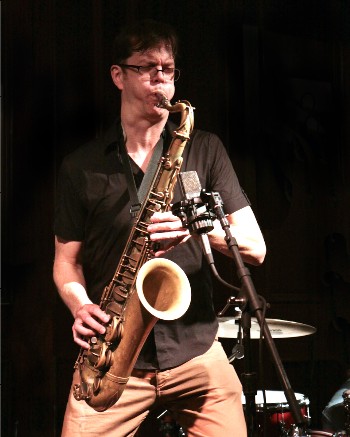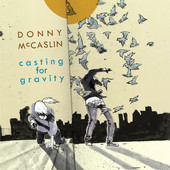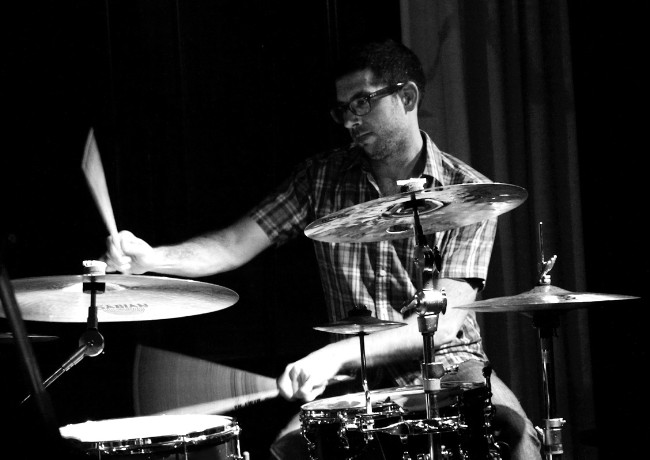Jazz Concert Review: Donny McCaslin – The Big Round Sound
It was a rocking night, full of fun and energy. It was intelligent, maybe even a bit brainy at times.
By Steve Mossberg

Tenor saxophonist Donny McCaslin — he and his musicians attacked like indie-rock musicians instead of jazz players. Photo: Kristophe Diaz.
Over the past two decades, Donny McCaslin has developed a reputation as a top-shelf tenor saxophonist with a big round sound. He’s capable of holding his own among the finest of his peers in electric and acoustic settings. His own projects, acoustic and electric, have always been high watermarks for straight-ahead playing and composition but have seldom been stylistic flashpoints in contemporary jazz. On October 10th at Scullers, however, McCaslin and his new electric quartet showed that that may just be about to change.
They were loud. So loud that a couple of the musicians had to pull out hearing protection halfway through the set. The general dynamic of the group was that of a bomb going off; they attacked like indie-rock musicians instead of jazz players. They often seemed legitimately surprised and delighted with the choices their band mates were making, relishing a shared spirit of adventure while navigating McCaslin’s difficult compositions.
In a sense, the material for the evening fit quite snugly into the ’70s fusion model. It was high-energy, electric, rock inflected, and clearly written as a challenge to its virtuoso players. While not aesthetically difficult to listen to, the pieces wore their complexity on their sleeves, giving the musicians countless opportunities to show off their expert timing and rhythmic versatility. On the other hand, the music dodged the negative fusion stereotypes of note-filled excess and overindulgent noodling. With cleverly balanced (and titled) pieces such as “Arena Jazz,” McCaslin seemed to wink at these pitfalls while gracefully skipping over them.
Many of McCaslin’s new pieces proffer conviction and cohesion. The opening number, “Casting For Gravity” (also the title of McCaslin’s new album), was a slow-paced but intense melodic composition with no improvisation from beginning to end. “Love Song For an Echo” sounded beautiful and abstract, even though it revolved around powerful, hymn-like motifs, woven lovingly into thick, electronic textures. Indeed, the focus of the leader’s writing did a lot to elevate the music beyond your routine electric “blowing session,” but even more striking were the individual contributions of the sidemen, who he chose very wisely.
Keyboardist Jason Lindner seemed to be remixing jazz tradition as he went along. Playing a Fender Rhodes with a synthesizer on top (a classic fusion combination) and a few effects pedals, he produced an astonishing array of sounds. When supporting the other musicians during their improvisations, he seemed just as likely to provide distorted effects as a major thirteen chord. He rarely made the predictable musical move. His own improvisations were often atmospheric and postmodern. On “Says Who,” he played an electric piano solo that began with cascading lines in the Chick Corea tradition, but he quickly chopped them up with stabs from the synthesizer, producing the effect of spliced samples in a Squarepusher song.
Across the stage from him, Mark Guiliana played contemporary drums in a decidedly more aggressive fashion. Though capable of great nuance and dynamic shading, he generally smacked his varied equipment strongly and evenly, producing very interesting, faux-electronic results. Like any good forward-thinking drummer in 2012, he is well versed in the art of quickly switching to a totally different (but complementary) tempo than the rest of the group and then dropping back in line. This produces a jarring effect: at first, it seems to be an error, but it is exhilarating once the listener’s ear catches up with the sonic zigs and jags. His propulsive grooves and solos kept both the audience and performers on their toes.
The veteran on the stage, though pretty young himself, was bassist Tim Lefebvre, who has shown his strength as a sideman with the best as long as McCaslin himself. Lefebvre possesses one of the largest sounds on the electric four-string in music today and was able to use it beautifully with Giuliana and Lindner. At one moment, he’d be finger picking in his upper register like a guitarist and in the next, he would create dark, pulsating sounds evocative of dubstep music. There were moments where the combination of bass and keyboards sounded like the rhythm section of a heavy metal band.
As for the leader, McCaslin did what he does superbly all night long. On the Led Zeppelin meets electric Freddie Hubbard tune “Losing Track of Daytime,” he demonstrated his blistering chops in the Michael Brecker tradition. On the trickily paced “Tension,” he slyly moved short, inquisitive phrases around while building up the impressive intensity of his tenor solo. The acoustic sound of his saxophone fit seamlessly into the cacophonous, plugged-in ensemble.
It was a rocking night, full of fun and energy. It was intelligent, maybe even a bit brainy at times. The band and compositions were always extroverted: never subtle, but also never overstated. McCaslin and his quartet showed that electric jazz is still fertile ground for musical growth, as long as you tend it with fresh ideas and nervy artistry.


